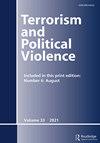Should I Signal Trust? Effect of Terrorism on Interpersonal Trust in Post-Conflict and Non-Post-Conflict Countries
IF 2.1
2区 社会学
Q1 INTERNATIONAL RELATIONS
引用次数: 0
Abstract
ABSTRACT Generalized interpersonal trust is an essential component of a functioning society. While some studies have examined how the perception of terrorism affects trust, cross-national works investigating the impact of actual terrorist attacks on individual trust remain mixed. In this paper, I use insights from existing studies to disaggregate generalized interpersonal trust in response to terrorism in two distinct dimensions, prosocial motivation, and strategic signaling. While threat perception from terrorism lowers interpersonal trust in all contexts, I argue that actual events distinctively shape a person’s interpersonal trust. In a relatively stable and secure context of a non-post-conflict country, individuals living closer to terrorist incidents express increased interpersonal trust. But in post-conflict countries, those closer to terrorist incidents tend to show more distrust. To test the argument, I use the World Values Survey dataset of fifty-two states and create a terrorism scale for 717 survey regions within the countries, considering their spatial and temporal closeness to each terrorist incident. Results obtained from three-level hierarchical models (state, region, and individual) are robust and contribute to our understanding of how terrorism shapes interpersonal trust in different contexts.我应该表示信任吗?恐怖主义对冲突后和非冲突后国家人际信任的影响
本文章由计算机程序翻译,如有差异,请以英文原文为准。
求助全文
约1分钟内获得全文
求助全文
来源期刊

Terrorism and Political Violence
Multiple-
CiteScore
5.60
自引率
8.30%
发文量
87
期刊介绍:
Terrorism and Political Violence advances scholarship on a broad range of issues associated with terrorism and political violence, including subjects such as: the political meaning of terrorist activity, violence by rebels and by states, the links between political violence and organized crime, protest, rebellion, revolution, the influence of social networks, and the impact on human rights. The journal draws upon many disciplines and theoretical perspectives as well as comparative approaches to provide some of the most groundbreaking work in a field that has hitherto lacked rigour. Terrorism and Political Violence features symposia and edited volumes to cover an important topic in depth. Subjects have included: terrorism and public policy; religion and violence; political parties and terrorism; technology and terrorism; and right-wing terrorism. The journal is essential reading for all academics, decision-makers, and security specialists concerned with understanding political violence.
 求助内容:
求助内容: 应助结果提醒方式:
应助结果提醒方式:


